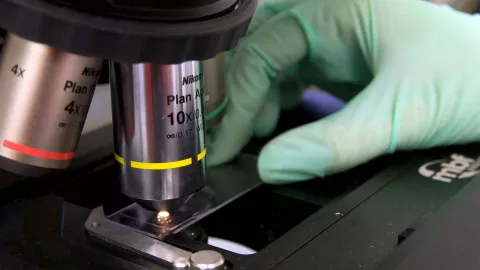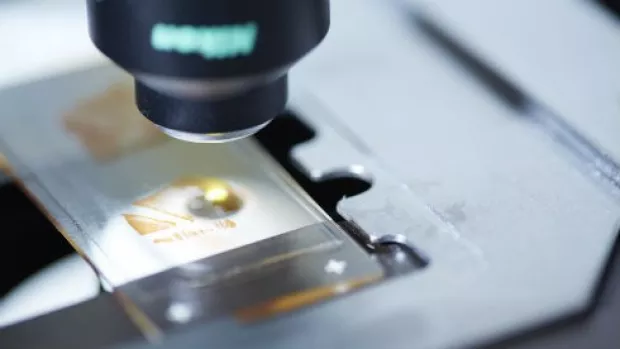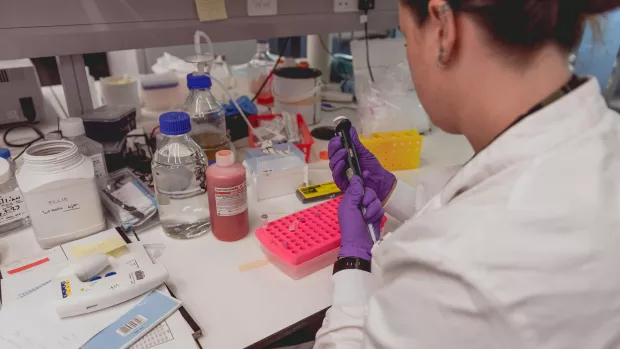
New research identifies which type of nerve cells are lost in MS
Research from the MS Society Edinburgh Centre for MS Research has shown that a type of nerve cell called inhibitory interneurons are lost in people who have MS. This opens up new avenues for the development of treatments to protect nerves.
What did the researchers discover?
We know that myelin, the protective coating around nerves, is damaged in MS. But there are lots of different types of nerves, so to be able to properly protect them, we need to know which ones are most affected by MS.
Using brain tissue samples from the MS Society Tissue Bank, Professor Anna Williams and her team found a dramatic reduction in the number of inhibitory interneurons in tissue from people who had been living with MS compared to people without the condition.
Another type of neuron – stimulating neurons – remained the same, even in people who had MS for decades. So it’s clear not all nerves are damaged in the same way by MS. This is the first project to show the selective loss of specific nerve cells in people with MS.
What does this mean for people with MS?
The treatments we currently have for MS target the immune system and reduce the damage to myelin. But to truly stop MS and stop disability progression, researchers need to find treatments that can replace lost myelin and protect nerves from damage.
This project helps us understand more about which nerves are damaged in MS and why. This gives us a greater understanding of how we might protect nerves from damage.
Professor Anna Williams, who led the study, explained: “Our research has shown that a specific type of neuron, called an inhibitory interneuron, is damaged in people with MS. This is really important because, in the search for new treatments, it focuses our efforts on trying to stop the damage and death of these special cells. Our next step is to convert this knowledge into new treatments that protect nerves and prevent neurodegeneration – and ultimately disability – in people living with MS.”
Testing treatments in mice
The research team also generated a new mouse model of myelin damage, which showed the same selective loss of inhibitory neurons seen in humans. This told the researchers that myelin damage leads directly to nerve damage.
Researchers will now be able to test new treatments in these mice to see if they can prevent the inhibitory neurons from being damaged. This will help develop new treatments to protect nerves in MS.
Dr Lida Zoupi, who worked on this study, said: “In our mouse model, we show that demyelination directly leads to neurodegeneration, answering a long-standing debate between MS researchers in the process. By confirming this, we have a vital new insight into the mechanisms behind neurodegeneration, which could potentially be used as a model for the development of neuroprotective treatments.”
Importance of charity funded research
Dr Emma Gray, Assistant Director of Research at the MS Society, said: “In order to stop MS, we need to find ways to prevent immune attacks, repair myelin and protect nerves from damage. We’ve made huge progress in finding treatments that target the immune system, but many people living with MS still don’t have access to effective treatments. We believe this study represents a vital step in our mission to stop MS.
“Work like this, which is based at our Edinburgh Centre and used samples from the MS Society Tissue Bank, shows just how important charity funded research is to the overall research landscape, and we’re proud to have made it possible.”
#ResearchAtRisk
Initiatives like these have enabled critical breakthroughs in MS research and treatment. But COVID-19 has put charity-funded #ResearchAtRisk.
We remain on the cusp of a major breakthrough – and must keep going.
Join us in calling on the Government to ensure vital funding for research into MS continues
Covid-19 won’t stop us stopping MS.




